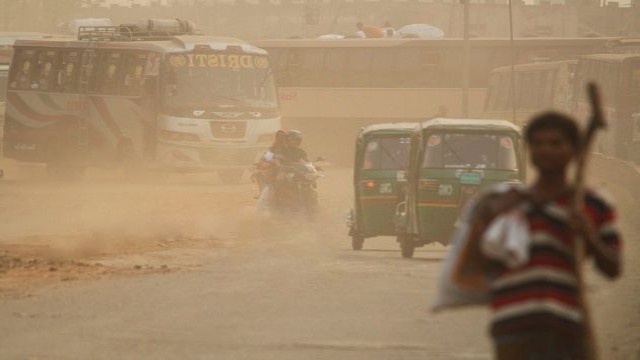At 9:01 a.m. on Wednesday, February 28th, Dhaka, the capital of Bangladesh, rose to the top position globally among cities facing severe air pollution. Recording an alarming Air Quality Index (AQI) of 239, Dhaka is now in the midst of a significant environmental emergency.
Shenyang in China (194), Kathmandu in Nepal (178), Wuhan in China (172), Lahore in Pakistan (171) and Kolkata in India (170) occupy the second, third, fourth, and others respectively, underscoring the widespread nature of this environmental challenge.

The Air Quality Index (AQI) is an indicator that measures the level of air pollution in different cities. The AQI value for particle pollution, which is one of the most harmful pollutants, can range from 0 to 500. The higher the AQI value, the worse the air quality and the more health risks for residents. According to the AQI, air quality can be classified into six categories:
Good (0 - 50): Air quality is considered satisfactory, and air pollution poses little or no risk. No specific cautionary measures are necessary.
Moderate (51 - 100): Air quality is acceptable; however, for some pollutants, there may be a moderate health concern for a very small number of people who are unusually sensitive to air pollution. Active children, adults, and individuals with respiratory diseases (such as asthma) should limit prolonged outdoor exertion.
Unhealthy for Sensitive Groups (101 - 150): Members of sensitive groups (such as those with respiratory conditions) may experience health effects. The general public is not likely to be affected significantly.
Unhealthy (151 - 200): Everyone may begin to experience health effects. Members of sensitive groups may experience more serious health effects. Active children, adults, and individuals with respiratory diseases should avoid prolonged outdoor exertion. Others, especially children, should also limit outdoor exertion.
Very Unhealthy (201 - 300): Health warnings indicate emergency conditions. The entire population is more likely to be affected. Active children, adults, and people with respiratory diseases should avoid all outdoor exertion. Everyone else, especially children, should limit outdoor activities.
Hazardous (300+): A health alert—everyone may experience more serious health effects. All outdoor exertion should be avoided.
In urban areas with elevated AQI levels, residents may encounter a range of heart and cardiovascular complications, including hypertension, inflammation, irregular heartbeats, and the development of arterial plaque.
Dhaka contends with persistent air pollution issues, exacerbated notably during the winter months due to unfavourable weather conditions. However, intermittent respite may occur during the monsoon season.
The World Health Organization (WHO) underscores the alarming global impact, with approximately 70 million individuals worldwide afflicted by air pollution-related ailments annually. This statistic underscores the pressing imperative to tackle Dhaka's air pollution crisis.































Comment: